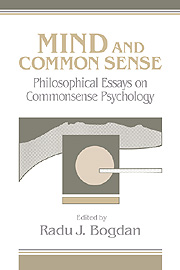Book contents
- Frontmatter
- Contents
- List of Contributors
- 1 The Folklore of the Mind
- 2 Analysis without Noise
- 3 Folk Psychology and the Explanation of Human Behavior
- 4 Methodological Reflections on Belief
- 5 Consciousness and Content
- 6 The Inevitability of Folk Psychology
- 7 How is Eliminative Materialism Possible?
- 8 The Long Past and the Short History
- 9 Common Sense Naturalized: The Practical Stance
- Index
6 - The Inevitability of Folk Psychology
Published online by Cambridge University Press: 24 September 2009
- Frontmatter
- Contents
- List of Contributors
- 1 The Folklore of the Mind
- 2 Analysis without Noise
- 3 Folk Psychology and the Explanation of Human Behavior
- 4 Methodological Reflections on Belief
- 5 Consciousness and Content
- 6 The Inevitability of Folk Psychology
- 7 How is Eliminative Materialism Possible?
- 8 The Long Past and the Short History
- 9 Common Sense Naturalized: The Practical Stance
- Index
Summary
There are many things one can mean by folk psychology, and most of them exist. One can mean the characteristic commonsense uocabulary of mind: ‘belief, desire’, ‘memory’, ‘fear’, and so indefinitely on. One can mean explanatory theories of different degrees of generality, current in different cultures. One can mean the beliefs one forms about particular people at particular times. One can mean the strategies for forming beliefs, expressed in commonsense terms, which can be used in explaining people's actions. All of these have their place. I am particularly interested in the last of them, strategies. (Perhaps it is the only one whose existence could be seriously questioned!)
The important questions about all of these can be classified as semantical and syntactica. Semantical questions concern relations to nonconceptual things: Do vernacular psychological terms refer to real features of people? Are any of the theories true? Syntactical questions concern form and mental representation: Do we learn the theories one by one as part of our general wordly lore? Are the meanings of the terms represented by definitions in a language of thought or by some connectionist schema?
Semantical and syntactical questions interact. In particular the answers one gives to semantical questions about folk psychology partly determine which syntactical questions it makes sense to ask. Someone might, for example, deny that folk psychology involves any beliefs at all. (She might think it consists just of attitudes such as affection and fear.)
- Type
- Chapter
- Information
- Mind and Common SensePhilosophical Essays on Common Sense Psychology, pp. 93 - 122Publisher: Cambridge University PressPrint publication year: 1991
- 1
- Cited by



